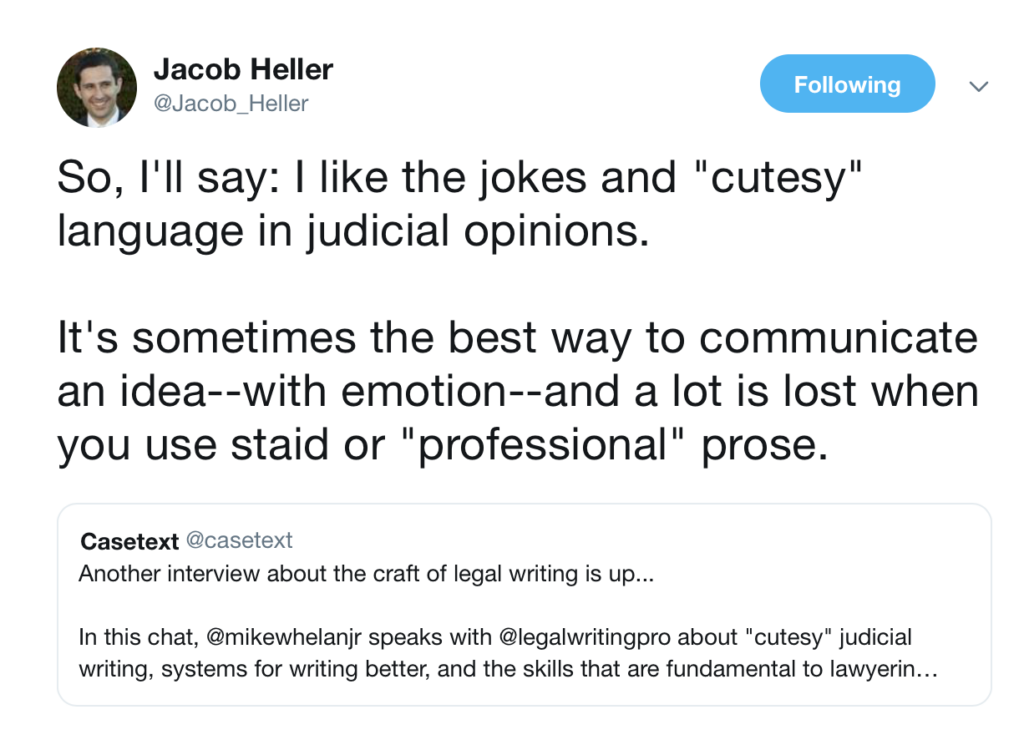
Short stories, emojis, pop culture references… the writing coming out of some federal courts is getting more (to put it kindly) creative. Is that a good thing?
To get a handle on this uptick in judicial personality, I brought in Legal Writing Pro‘s Ross Guberman. He has taught several judges how to make their writing more accessible and had thoughts about whether it’s gone too far.
To start our conversation, I pointed Ross to a tweet I’d seen that discussed a recent holding in the Fifth Circuit. The tweeter didn’t like the opinion much, but said “At least Justice Willett didn’t write it so we don’t have to see his cutesy ‘look at me’ style.”
(Of course I now can’t find that particular tweet, but here’s another to give you a flavor of what the writer was talking about…)

As a Texas lawyer, I’ve followed the writings of Justice Don Willett with some interest. I’ve noticed that his readers have a love/hate relationship with his folksy style, so I asked Ross why that might be. Here’s what he had to say:
That’s a problem – how do you really distinguish between what people think of the writing, when you’re talking about a lawyer or a judge, and what people think about the content? Because so often people in their own minds will merge the two.
Ross started with a question about whether the love/hate feeling toward Willett’s writing might have more to do with substance than style.
Suddenly, when someone doesn’t like a ruling, they find all sorts of writing flaws as well. That’s a segue into this whole cutesy thing. I’ve noticed that people choose different adjectives to describe the same sentence or paragraph for general style.
I agreed with Ross, pointing out that what one person calls creative another will call “cutesy.” If you find yourself annoyed with the language of a ruling, Ross suggested that you start by checking your biases. It’s possible you’re feeling critical because of something that goes beyond style.
While encouraging readers to consider their own biases about a judge’s style, Ross still admitted that the trend toward informality is genuine.
You have you have a real trend in the last few years of judges putting in jokes and pop culture references, even things like “hmmm” and “LOL.” It borders on the kind of prose you just do not associate with professional product.
Ross noted that the trend is coming largely coming from federal courts, not from state courts. Whether it’s a bad trend or not largely depends on your perspective.
People who like the judge also like the informal instinct. They say it’s wonderfully refreshing and a great antidote to the overly formal stiffs in our pretentious profession. Other people, very often again when they don’t like the underlying points, find it completely unprofessional.
The question, then, seems to be how you can add personality without distracting from the core argument or message. Extreme informality may have the effect of polarizing your readers, and Ross points out that it creates a precarious balance.
The idea is that it should be straight forward, more natural, more conversational, maybe a little more fun, less formal – you can see how that could very easily spill over into cutesy or even maybe inappropriate. So that’s a problem.
As Ross states in conclusion, this complaint about cutesy feels like so many others.
We’re all complaining in this profession. Every group complains about other groups, but sometimes we’re giving mixed messages.
So whatever you think about the informal language of judges, Ross would tell you to be consistent. Shows of personality should be measured as good or bad regardless of a writer’s particular position.
He’d also advise that, if you’re thinking of writing with extra shots of wit, first know the risks. The social good that comes from more human language could have costs to your reputation or case. If you’re looking at those risks with eyes wide open, and if you and your client accept them, I say go for it. Add those emojis and let the curmudgeons gruff.
That is, of course, unless your judge is one of those curmudgeons. 😉
For the record, here’s how Casetext CEO Jake Heller feels about the trend to the informal…

What about you?
To see the entire interview with Ross, check out the video below…
And take a look at the other articles in this series on better writing for lawyers. We’re happy to support the development of good writing habits and would love a chance to explain how you can incorporate Casetext’s AI-enabled research tools to enhance your skills.
Please take a moment to schedule a demo of Casetext’s research tools, and take advantage of our free trial. As you’ll see, we aim to help good lawyers like you improve their craft.
Rapidly draft common legal letters and emails.
How this skill works
Specify the recipient, topic, and tone of the correspondence you want.
CoCounsel will produce a draft.
Chat back and forth with CoCounsel to edit the draft.
Get answers to your research questions, with explanations and supporting sources.
How this skill works
Enter a question or issue, along with relevant facts such as jurisdiction, area of law, etc.
CoCounsel will retrieve relevant legal resources and provide an answer with explanation and supporting sources.
Behind the scenes, Conduct Research generates multiple queries using keyword search, terms and connectors, boolean, and Parallel Search to identify the on-point case law, statutes, and regulations, reads and analyzes the search results, and outputs a summary of its findings (i.e. an answer to the question), along with the supporting sources and applicable excerpts.
Get answers to your research questions, with explanations and supporting sources.
How this skill works
Enter a question or issue, along with relevant facts such as jurisdiction, area of law, etc.
CoCounsel will retrieve relevant legal resources and provide an answer with explanation and supporting sources.
Behind the scenes, Conduct Research generates multiple queries using keyword search, terms and connectors, boolean, and Parallel Search to identify the on-point case law, statutes, and regulations, reads and analyzes the search results, and outputs a summary of its findings (i.e. an answer to the question), along with the supporting sources and applicable excerpts.
Get a thorough deposition outline in no time, just by describing the deponent and what’s at issue.
How this skill works
Describe the deponent and what’s at issue in the case, and CoCounsel identifies multiple highly relevant topics to address in the deposition and drafts questions for each topic.
Refine topics by including specific areas of interest and get a thorough deposition outline.
Ask questions of contracts that are analyzed in a line-by-line review
How this skill works
Allows the user to upload a set of contracts and a set of questions
This skill will provide an answer to those questions for each contract, or, if the question is not relevant to the contract, provide that information as well
Upload up to 10 contracts at once
Ask up to 10 questions of each contract
Relevant results will hyperlink to identified passages in the corresponding contract
Get a list of all parts of a set of contracts that don’t comply with a set of policies.
How this skill works
Upload a set of contracts and then describe a policy or set of policies that the contracts should comply with, e.g. "contracts must contain a right to injunctive relief, not merely the right to seek injunctive relief."
CoCounsel will review your contracts and identify any contractual clauses relevant to the policy or policies you specified.
If there is any conflict between a contractual clause and a policy you described, CoCounsel will recommend a revised clause that complies with the relevant policy. It will also identify the risks presented by a clause that does not conform to the policy you described.
Get an overview of any document in straightforward, everyday language.
How this skill works
Upload a document–e.g. a legal memorandum, judicial opinion, or contract.
CoCounsel will summarize the document using everyday terminology.
Find all instances of relevant information in a database of documents.
How this skill works
Select a database and describe what you're looking for in detail, such as templates and precedents to use as a starting point for drafting documents, or specific clauses and provisions you'd like to include in new documents you're working on.
CoCounsel identifies and delivers every instance of what you're searching for, citing sources in the database for each instance.
Behind the scenes, CoCounsel generates multiple queries using keyword search, terms and connectors, boolean, and Parallel Search to identifiy the on-point passages from every document in the database, reads and analyzes the search results, and outputs a summary of its findings (i.e. an answer to the question), citing applicable excerpts in specific documents.
Get a list of all parts of a set of contracts that don’t comply with a set of policies.
Ask questions of contracts that are analyzed in a line-by-line review
Get a thorough deposition outline by describing the deponent and what’s at issue.
Get answers to your research questions, with explanations and supporting sources.